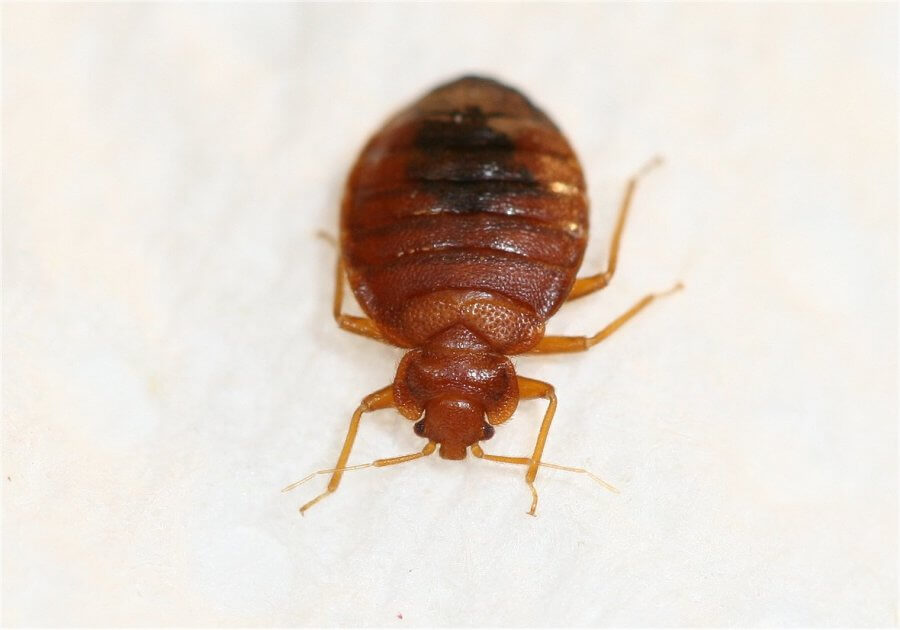Of all of the kinds of pest infestations that can disrupt a household or business, bed bugs are one of the worst. Although they are not known to carry disease, these parasites spread quickly and easily from one room or one house to another. Bed bugs can live up to a year, even without a host, if the conditions are just right. This makes them notoriously difficult to eliminate.
Here’s what you need to know about these pesky pests.
The Bed Bug Lifecycle
Before a bed bug can mature into an adult, it will pass through several growth stages, which include:
- Egg
- Nymph (1st-5th stages)
- Adult
During each of these stages, bed bugs are susceptible to elimination by various means, including our recommended method: Freezing via a Cryonite machine.
Eggs
Bed bug eggs look like milky white dots about the size of the head of the pin. They are similar in appearance to a large grain of salt or a small grain of rice. Bed bugs usually take anywhere from 2 to 10 days to hatch.
Nymphs
After bed bugs break out of their eggs, they are called nymphs. A bed bug nymph is a juvenile bed bug that must go through five developmental stages (known as instars) before becoming an adult.
Bed bug nymphs grow in size and darken in color as they mature. To pass from one stage to the next, the nymphs must feed on a host and molt their exoskeletons. On average, it takes a nymph anywhere from 21 days to five weeks to become an adult bed bug.
Adults
Once a bed bug nymph has fully matured, it becomes an adult bed bug. Adult bed bugs feed about once per week, which is why they tend to live in beds or furniture, so that they can stay close to their hosts. Once they reach the adult stage, bed bugs spend most of their time feeding, digesting, or mating.
Factors That Affect the Bed Bug Lifespan
Bed bugs can live for an average of 6 to 12 months. The two main factors that can affect their lifespan are food availability and ambient temperatures.
Food Availability
Bed bugs are parasites. They need to feed on a host in order to survive. Red, itchy bug bites are one of the hallmarks of a bed bug infestation. This is why bed bugs are commonly found on mattresses, where they can get easy access to their preferred food source.
It might seem that, without access to a host, these parasites would die off quickly. In fact, quite the opposite is true. Without food, bed bugs lie dormant in near-starvation. They can live for 6 to 12 months without food.
Ambient Temperatures
Temperature is the other main factor that will affect the lifespan of a bed bug. Moderate, cool temperatures are the ideal living condition for bed bugs. According to the non-profit organization BIRC, bed bugs cannot survive for long in temperatures over 113°F or under 32°F.
Why is a Quick Response Crucial?
When it comes to bed bugs, timing is everything. A female adult bed bug can lay 5 to 7 eggs per week, almost one each day. These parasites mature quickly. When they are fully matured, new female adults will lay their eggs. Their exponential growth can lead to an overwhelming situation if left unchecked.
Just a few bed bugs can create a vast infestation in very little time. Any infestation must be confronted and eliminated as soon as it is discovered, no matter how insignificant it may seem. Bed bugs must be killed effectively and immediately; otherwise, they can spread to other parts of a home.
How is Cryonite Effective Against Bed Bugs?
A Cryonite machine can eliminate a bed bug infestation quickly and safely! It uses carbon dioxide and a patented nozzle to deliver a stream of dry ice at -110° Fahrenheit. Bed bugs are frozen and killed immediately on contact.
Unlike pesticides, which can be harmful to humans and pets, Cryonite machines contain no toxic chemicals. They can be used without risk in all of the places where bed bugs prefer to gather: Mattresses, furniture, pet beds, and more. The process leaves no residue, so it can be used on all surfaces to ensure that all of the bed bugs have been killed and removed. For more information on Cryonite machines and the ways that they can eliminate bed bugs, please contact us.

